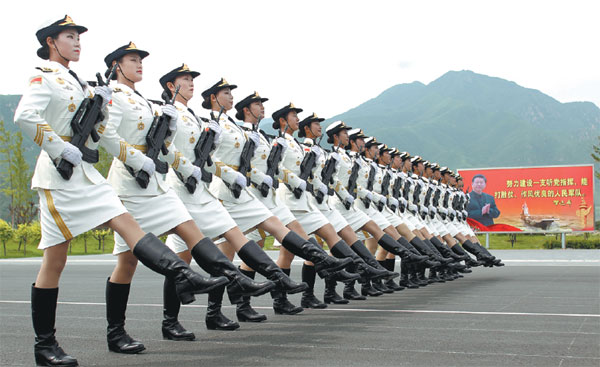China can help to make the world a safer place
Updated: 2015-08-26 07:50
By Zhou Bo(China Daily)
|
||||||||
 |
|
Female honor guards train at a camp in Beijing ahead of the military parade in the capital on Sept 3. Photo by Zou Hong / China Daily |
China will mark the 70th anniversary of the victories in the War of Resistance Against Japanese Aggression (1937-45) and the world anti-fascist war with a parade in Beijing's Tian'anmen Square on Sept 3. It remains to be seen how this parade will be viewed by the international community, whether they will see it differently to a similar parade in Moscow's Red Square, which was attended by President Xi Jinping.
A parade in Tian'anmen Square is a time-honored tradition. But one celebrating the victory of World War II would be exceptional. Many countries in Asia were involved in the war. But no other country has fought so hard for so long against Japanese invaders and suffered such huge losses. However, the parade in Beijing is more than a gala for all who suffered and then won. It is meant to project China as a peace-loving country that will never allow such trauma to happen again, and to convince the world that China's growing military strength, rather than saber-rattling, is for the peace of itself and that of others.
China is rising, amid awe, fear and admiration. It is getting closer to the place it had once enjoyed in its heydays. But a rising China yearns to be loved rather than awed, let alone feared. From 1949 to 1979, albeit for different reasons, China fought a war in every decade. During the Cold War era, China had to prepare for the worst scenario involving confrontations with two superpowers at same time. But from 1980 onward, China has not used force in any dispute with any country. In other words, China's growth in comprehensive national strength since reform hasn't made it belligerent and its integration with the outside world have made its behavior more benign and predictable.
China's rise has been peaceful, but not as a result of good luck. In the last two decades, there were quite serious challenges that could have derailed China from its fast track since 1979, such as former Taiwan leader Chen Shui-bian's call for referendum on independence in Taiwan, NATO's bombing of the Chinese embassy in erstwhile Yugoslavia, a Chinese aircraft's collision with an American aircraft above China's exclusive economic zone, to name but a few. Any one of these could have triggered a conflict or war. But China has managed these with utmost restraint.
The Chinese military is more cautious overseas. It was not until 2014 that China decided to send an infantry battalion for peacekeeping in South Sudan, more than 20 years after it first sent peacekeeping observers overseas.
By inviting world leaders to come to Beijing for the parade, China wishes to send a message: China can join the world in safeguarding the international order. Although it has veto power as a permanent member of the UN Security Council, for many years, China believed it was wearing a straitjacket of international systems and regimes that are made by the West.
- Missile launchers tested in drills to march in V-day parade
- Foreign war heroes to attend China's V-Day parade
- Neighboring province to cut emissions for Beijing's V-Day parade
- 1,000 foreign troops to march in China's V-Day parade
- V-Day parade to highlight China's military progress
- China's female honor guards to appear in V-Day parade
- Global health entering new era: WHO chief
- Brazil's planning minister steps aside after recordings revelation
- Vietnam, US adopt joint statement on advancing comprehensive partnership
- European border closures 'inhumane': UN refugee agency
- Japan's foreign minister calls A-bombings extremely regrettable
- Fukushima impact unprecedented for oceans: US expert

 Stars of Lijiang River: Elderly brothers with white beards
Stars of Lijiang River: Elderly brothers with white beards
 Wealthy Chinese children paying money to learn British manners
Wealthy Chinese children paying money to learn British manners
 Military-style wedding: Fighter jets, grooms in dashing uniforms
Military-style wedding: Fighter jets, grooms in dashing uniforms
 Striking photos around the world: May 16 - May 22
Striking photos around the world: May 16 - May 22
 Robots help elderly in nursing home in east China
Robots help elderly in nursing home in east China
 Hanging in the air: Chongqing holds rescue drill
Hanging in the air: Chongqing holds rescue drill
 2.1-ton tofu finishes in two hours in central China
2.1-ton tofu finishes in two hours in central China
 Six things you may not know about Grain Buds
Six things you may not know about Grain Buds
Most Viewed
Editor's Picks

|

|

|

|

|

|
Today's Top News
Liang avoids jail in shooting death
China's finance minister addresses ratings downgrade
Duke alumni visit Chinese Embassy
Marriott unlikely to top Anbang offer for Starwood: Observers
Chinese biopharma debuts on Nasdaq
What ends Jeb Bush's White House hopes
Investigation for Nicolas's campaign
Will US-ASEAN meeting be good for region?
US Weekly

|

|








